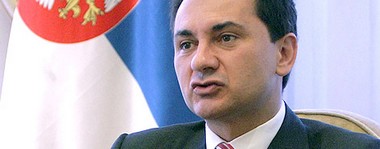- Serbia
Get to know Serbia
- Citizens
Culture and science
Health services
Pension and disability insurance
- Business
Employment
Economy
- Media
- Government
- Contact
Keep in touch
Contact form
Back
Keepin touch
Whether you have a question, comment, suggestion or any problem in the purview of the government, send us your message and we will try to respond as soon as possible. If your problem is not in our purview, we will forward your message to the relevant institution.
Q:
A:
Serbia’s application for EU candidacy must be agreed upon with the EU
Belgrade,
18 September 2009
Deputy Prime Minister for EU integration Bozidar Djelic today stated that Serbia’s application for EU candidacy must be agreed upon with the EU because otherwise it would be a political act without concrete effects.
In an interview for today’s edition of the Blic daily Djelic noted that applying for candidacy is not an issue and Serbia could do that tomorrow, but that would make no sense without agreement with its European partners.
The candidacy application must be previously agreed upon with the EU, whose goal is to grant candidate status and begin accession talks, Djelic stressed, recalling that implementation of the Stabilisation and Association Agreement (SAA) is a prerequisite for being granted candidate status.
He said the timetable for candidates will not be altered for Serbia’s sake, which is why its efforts must now focus on the implementation of the Transitional Trade Agreement because Serbia needs to provide fundamental and sustainable progress.
When asked whether the EU is now closer to unfreezing the Transitional Trade Agreement and the SAA, Djelic recalled the words by Austrian Minister of Foreign Affairs Michael Spindelegger who said that Austria will campaign for the implementation of the agreements at the EU summit in October.
However, if that is not possible, we will wait for Serge Brammertz’s new report in December. In the meantime, Serbia will keep working to achieve its goal, the Deputy Prime Minister said, adding that the final decision on visa abolishment for Serbia, Montenegro and Macedonia is expected in late November and will be implemented from 2010.
Djelic recalled that the EU’s report on Serbia’s EU integration progress, to be made public on October 14, will be the most favourable report so far.
He noted that the report speaks favourably of Serbian Parliament’s considerable activity, adding that along with the usual suggestions the report will also show that Serbia already has the administrative capacity for candidacy and accession talks.
Speaking about the agreement signed yesterday in Brussels with EU Commissioner for Enlargement Olli Rehn about the EU’s budget support to Serbia of €100 million, Djelic stressed that this shows Brussels’ trust in the reforms being implemented in Serbia.
The agreement will bring us €100 million to support the budget and we will use these funds for pensions, housing loan subsidies, infrastructure investments and other necessary purposes. The EU therefore obviously acknowledges our reforms because it granted such funds only in Serbia’s case, he concluded.
The candidacy application must be previously agreed upon with the EU, whose goal is to grant candidate status and begin accession talks, Djelic stressed, recalling that implementation of the Stabilisation and Association Agreement (SAA) is a prerequisite for being granted candidate status.
He said the timetable for candidates will not be altered for Serbia’s sake, which is why its efforts must now focus on the implementation of the Transitional Trade Agreement because Serbia needs to provide fundamental and sustainable progress.
When asked whether the EU is now closer to unfreezing the Transitional Trade Agreement and the SAA, Djelic recalled the words by Austrian Minister of Foreign Affairs Michael Spindelegger who said that Austria will campaign for the implementation of the agreements at the EU summit in October.
However, if that is not possible, we will wait for Serge Brammertz’s new report in December. In the meantime, Serbia will keep working to achieve its goal, the Deputy Prime Minister said, adding that the final decision on visa abolishment for Serbia, Montenegro and Macedonia is expected in late November and will be implemented from 2010.
Djelic recalled that the EU’s report on Serbia’s EU integration progress, to be made public on October 14, will be the most favourable report so far.
He noted that the report speaks favourably of Serbian Parliament’s considerable activity, adding that along with the usual suggestions the report will also show that Serbia already has the administrative capacity for candidacy and accession talks.
Speaking about the agreement signed yesterday in Brussels with EU Commissioner for Enlargement Olli Rehn about the EU’s budget support to Serbia of €100 million, Djelic stressed that this shows Brussels’ trust in the reforms being implemented in Serbia.
The agreement will bring us €100 million to support the budget and we will use these funds for pensions, housing loan subsidies, infrastructure investments and other necessary purposes. The EU therefore obviously acknowledges our reforms because it granted such funds only in Serbia’s case, he concluded.
-
 Belgrade/Brussels, 19 November 2025
Belgrade/Brussels, 19 November 2025European integration shared responsibility of entire society
-
 Belgrade, 29 October 2024
Belgrade, 29 October 2024State moves to minimise advertising for betting shops
-
 Belgrade/Berlin, 28 January 2016
Belgrade/Berlin, 28 January 2016Fences cannot stop migrations
-
 Belgrade, 7 January 2016
Belgrade, 7 January 2016Serbia to experience dynamic economic growth in 2016
-
 Belgrade, 31 December 2015
Belgrade, 31 December 2015Serbia will persevere on path of development, reforms
-
 Belgrade, 30 December 2015
Belgrade, 30 December 2015Ground for Serbia’s progress set
-
 Belgrade, 28 December 2015
Belgrade, 28 December 2015Serbia ready for improvement of cooperation with Russia
-
 Belgrade, 22 December 2015
Belgrade, 22 December 2015Serbia ready to open six more chapters next year
-
 Belgrade, 21 December 2015
Belgrade, 21 December 2015Serbia to be part of EU by 2020
-
 Belgrade, 20 December 2015
Belgrade, 20 December 2015Serbia ready for EU membership by 2019


